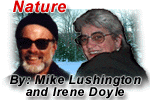|
 Owl survey
Owl survey
by: Mike Lushington
I am discovering that conducting owl surveys for Bird Studies Canada is
not to everyone's liking. In fact, over the past three years, I have only
found one kindred soul, someone who is willing to forego a good night's
sleep and the comforts of home for one of driving up and down remote
woodland roads, alternately playing recordings of owl calls, and
listening, more often than not in vain, for any response. Friends who are
otherwise interested birders turn rather shifty-eyed, develop coughs and
fumble for what could seem, to one more sceptical than I, to be feeble
excuses for not going with us.
Conducting an owl survey is a rather simple affair in concept. You are
assigned a route, courtesy of Birds Studies Canada, and issued a CD of owl
calls, a form or two to complete, a map of the route, and a list of
suggestions, recommendations and a protocol for conducting the survey
properly. Armed with all of the above, plus a reliable CD player, a
flashlight, note pads, a compass, a thermos of something hot, whatever
clothing that you think that you will need to keep you warm (think mid
January and you will be adequately prepared). and a full tank of gas for
the truck. You set out for the starting point of your route. You plan to
arrive there just after sundown, so you leave in plenty of time to account
for rough roads, possible wrong turns and other such hazards of woods
travel in the spring. Once there, you set up to begin the survey.
An owl survey consists of ten stops, each two kilometres further along
the route. At each of the stops you play the CD of owl calls - a process
that takes some ten minutes - and record anything that you heard. In all,
the survey itself takes about three hours. Depending on how far from home
you are, you may have to leave by, say, seven thirty in the evening to
arrive by nine, conduct the survey between nine and midnight, and the
drive back - to arrive home by, perhaps one-thirty. It's a piece of cake!
Thus it was that my intrepid fellow owler, and chief navigator, Jim
Clifford found ourselves in the woods, back by the Island Lake Club in the
southeast one night last week. We had been trying to get a good night -
one that promised to be clear and calm - for some time and this one
promised to be what we needed. It has been a balky spring; there have been
few good nights and we had found, on a couple of previous attempts, that
the cold and wet has seemed to depress the owls (in all senses of that
word, I guess). They haven't been calling with anything like the frequency
that we have come to expect. Jim pointed out that in past years we always
heard owls most frequently when we also heard spring peepers, wood frogs,
snipe and woodcock and all of them have been very quiet so far this year
as well.
This was a better night. In all, we heard six owls, some woodcock, the
first of the little spring frogs, and a partridge drumming (in the middle
of the night!) but we also saw two moose, a coyote, rabbits and grouse. We
also saw the Northern lights, several meteorites, literally millions of
stars - and had the experience of being in the woods for five or six hours
without seeing another vehicle and of being completely out of touch with
the rest of the human world. Apart from the sounds of rivers and brooks
and the occasional murmur of airplanes far overhead, it was silent. At one
point, Jim suggested that it would be a shame to hear an owl because it
would break the utter peace of the place.
As I mentioned at the outset, this does not seem to be a particularly
appealing way to spend a night for many people. Granted, it is an effort,
but I have yet to do one that I have regretted. There is something
wonderful about watching the woods move from the tranquility of sunset to
the mystery of night, of having that sense of being alone under more stars
than one can imagine - and of hearing the far off call of a Great horned
owl. For that little time, I am transported into a world that I know is
out there, but that I am privileged to experience only rarely.
|